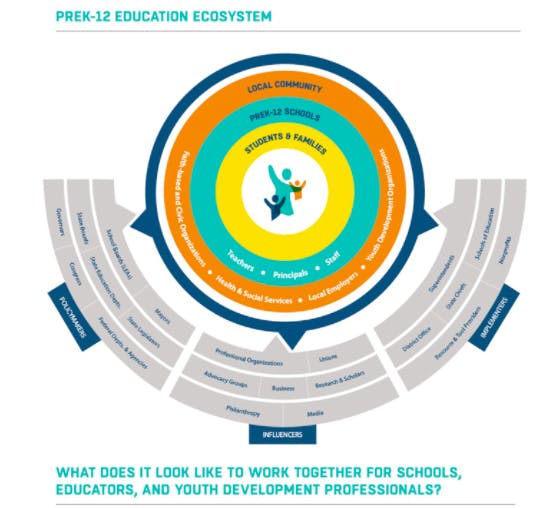Social, Emotional, and Cognitive Development
“How are the children?” is the traditional greeting of the Maasai Tribe located in parts of Kenya and Tanzania. The greeting places an emphasis on the importance of the well-being of children as a measure of the strength of a community, one which recognizes the trite but true meaning of “it takes a village.” In this pandemic-induced environment, this is a message that cannot be overstated. Our future depends on our children’s capacity to grow into secure, well-rounded individuals who are ready for college, career, and community.
The pandemic experience has renewed the sense of urgency for establishing coordinated programs and the training necessary to support the social, emotional, and cognitive development of all children. To achieve this, it will take the entire village - and that village is large - to enable the consistent delivery of school and community opportunities, and to anticipate and plan for the future.
Recently, I had the opportunity to chat with a mother of three children; her two oldest attend elementary school. Our conversation turned to the observations she is making about the effects of COVID-19 disruption on her children’s opportunities to develop the social skills and emotional support necessary for engaging with people beyond family. “Toni” (pseudonym) is concerned with her children developing age-appropriate social skills and feeling secure around adults. She understands the importance of how social, emotional, and cognitive development fit together and that she and her husband need the support of others, especially from school and community groups, to help their children develop these skills, which are vital to their kids’ long-term success. Her heartfelt comment was so true, causing me to reflect on a long-standing call-to-action for the support of developing the Whole Child. There has never been a better time to talk the talk and walk the walk-in support of our children.
The Whole Child Watershed Moment: Take One
In January of 2019, The Aspen Institute National Commission on Social, Emotional, and Academic Development released a report supporting a watershed moment in the importance of embracing the complicated connection of social, emotional, and cognitive development as the basis for students’ optimal learning to occur. According to the 80-page report: “The Commission was formed to seize on the momentum in local communities—as well as in policy, practice, and research—in order to build an even larger, more sustained conversation and call to action. Our aim is simple: to align what we’ve heard from educators, families, and students, and what we know from evidence about how children learn, with how schools and classrooms are designed and operate[sic]. We know more than we ever have about what it takes to educate all children well; now is the time to put that knowledge into practice for all children everywhere.” An executive summary of the report can be found here.
The Commission released six recommendations as follows:
- Set a clear vision that broadens the definition of student success to prioritize the whole child.
- Transform learning settings so they are safe and supportive for all young people.
- Change instruction to teach students social, emotional, and cognitive skills; embed these skills in academics and school-wide practices.
- Build adult expertise in child development.
- Align resources and leverage partners in the community to address the whole child.
- Forge closer connections between research and practice to generate useful, actionable information for educators.
Resource Alignment and Leveraging Partners to Support the Whole Child
At the time of its 2019 release, little did the Commission know that the momentum of the report’s Whole Child recommendations was a tidal wave compared to the tsunami of pandemic-induced momentum in our current call-to-action. Widespread and coordinated efforts in every sector of society to support children (each of whom was affected in unique and extraordinary ways on a personal level) will avoid COVID-19 having any long-term effects on their and their family’s well-being.
The Commission’s report features the PK-12 Education Ecosystem designed to bring together policymakers, influencers, and implementers who all have a role to play in supporting initiatives that foster the social, emotional, and cognitive growth development of the whole child.

The stage is set to live in this ecosystem in support of the Whole Child and to make expansive gains toward achieving the report's six recommendations. Through ESSER, policymakers have released unprecedented levels of funding to states and to school districts to ensure children’s needs are being met. Influencers are pushing for essential support to overcome unfinished learning, such as increasing adult capacity to understand child and adolescent development focusing on the care and well-being of adults working with children. There is a call for innovation, seizing the opportunity to seek new ways to solve long-standing disparities in achievement by activating the entire ecosystem to support the whole child. Implementers are working to address the needs of students knowing that recovery will be a multi-year and multi-faceted process requiring the coordinated work of many. To see this ecosystem at work through the efforts of many across all sectors pointing to the same outcome - developing the Whole Child - please visit A Nation At Hope.
The Whole Child Watershed Moment: Take 2
We have a renewed opportunity before us to make good on the six recommendations from the Aspen Institute’s Commission on Social, Emotional, and Academic Development report. Innovative and transformative recommendations that are right for the time we are in. By investing the ESSER dollars in family, school, and community settings where children learn and grow in safe, relationship-based environments we can ensure academic success, a sense of belonging, and success for our children and society in the short and long term. Fundamental to fostering a stronger, more vibrant community is investing time, attention, and resources needed to build the village our children deserve.
.png?ixlib=gatsbyFP&auto=compress%2Cformat&fit=max&q=50)